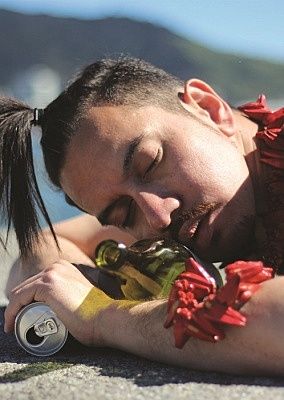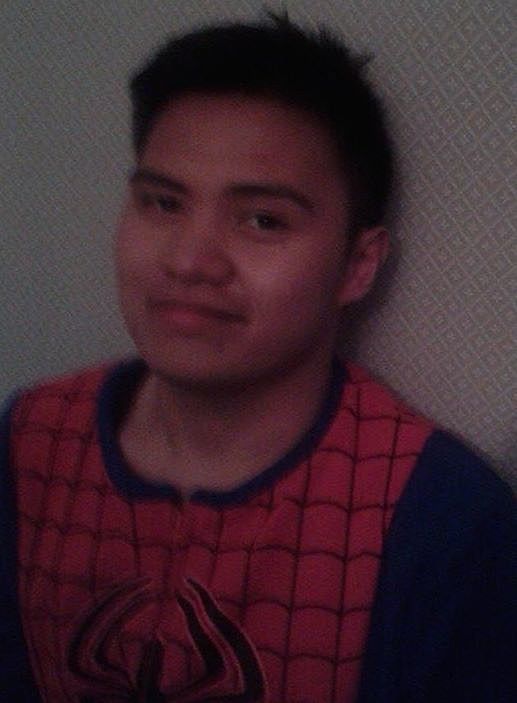Nokise Protests The Bullshit
Matt Loveranes reviews James Nokise's Rukahu, a protest against liberalist attitudes to Pacific culture and art, that returns to BATs this week.
Matt Loveranes reviews James Nokise's Rukahu, a protest against liberalist attitudes to Pacific culture and art, that returns to BATs this week.
Bullshit.
They say that doing it successfully is an art. In Rukahu, James Nokise proves that putting up with it is too. Nokise is an artist who is never one to back down from polite conventions; in his stand-up routines, he often points the spotlight on polite society and how we view and represent Pacific culture. His jokes are charmingly and affably delivered, cleverly concealing the undercurrent of discontent. And in Rukahu, a solo show which originally debuted in 2015’s NZ Fringe Festival, he presents his most direct and damning indictment of the status quo yet. It’s funny, angry and uncompromising. And as a person of colour, it’s one of the most triumphant and heartfelt expressions of rebellion I’ve ever seen committed to stage.
Nokise’s vessel is the fictional Jon Bon Fasi, an acclaimed Samoan artist known the world over as a master of theatre, dance, poetry and “pasifika”. Fasi is amiable, charismatic and quick but most importantly, he’s a Grade-A bullshitter. By employing white guilt, he obtains $75, 000 worth of funding from Creative New Zealand to fund his next show, “In Search of Pasifika”. The audience isn’t spared either. He bullshits them early and unsuspectingly. “If you disagree, you’re racist”, he says as he leads them in a non-traditional powhiri before they enter the theatre. They acquiesce, partly in respect to the performer, but also because some of them don’t know any better. There’s no need to question why a Maori custom would have a place in a Samoan performer’s show. All “brown” cultures are interchangeable to some of the audience, apparently.
Nokise leans in to that ignorance by conceiving Fasi as a stereotype, what a liberally-inclined white audience member would conceive a “Pasifika” artist to be. He makes a ritual of donning his Samoan lavalava and dances to a traditional Samoan dance. But even in the smallest of details, Nokise shines the critical mirror. In truth, his lavalava is from the Cook Islands and he’s dancing to Fijian tunes. Even in the smallest of details, he eviscerates the dangerous term “Pasifika”, that in its catch-all purpose, reduces different cultures into homogeneity. Nokise peppers the show with Easter Eggs such as these, meant for his Pacific Island brethren in the audience. It’s a small wink of solidarity against their oppressors.
This attention to detail extends in realizing the show’s form. It’s a tough tightrope Nokise walks, creating an engaging show that feels haphazardly put together but really isn’t. Michael Trigg’s shoddily designed set and improvisational lighting design does a lot of the work, elevating ugliness to art. Director Erina Daniels keeps Nokise’s performance to the same standards, unvarnished and a bit tentative. It all works because Nokise commits to every intricately choreographed and plotted beat. The controlled chaos allows for a free-flowing, relaxed and consistently entertaining romp which also assures the audience that they’re in safe hands no matter how unwieldy the show gets.
And it goes to some very interesting places. As Fasi regales us with how he travelled the world and bled funding money in search of his elusive “Pasifika”, he performs a poem, dance or story to help tell the tale of each new destination. These are often clumsily conceived or heavy handed, dealing with “important” themes such as domestic violence or homophobia within the community. Nokise plays them for laughs but it’s a shrewd critique of the one-track view we have of the type of Polynesian stories we deem worth telling. It’s in this constant push and pull where Nokise shines brightest. As the show goes along, Nokise’s barbs become less veiled and more pointed. But despite his harshest attacks, his stories are always balanced by natural charm and a genuine affinity for his subjects, his homeland and genuine appreciation of cultural differences.
It's only a matter of time, however, before this playful tug-of-war with his audience has to give; and when it finally does, Nokise spares nothing and no one, least of all, himself. “What am I doing?”, he laments when the moment finally arrives. “What is this shit? Someone has funded this bullshit”. It’s a searing condemnation and one that blurs the line between character and actor. All jokes are gone and are replaced by an impassioned tirade about how debilitating the effects colonialism has impacted voices of colour to this day. It is a tricky moment that works beautifully because he is not afraid to hold the audience culpable of their myopia. He dares to go against the trust he’s earned and he wins. In this moment, Jon Bon Fasi is no joke anymore. He’s fed up with the bullshit he’s faced, and the bullshit he’s perpetrated. What he says is loud and clear. Things need to change but they’re probably not going to. And whose fault is that?
It’s not difficult to view Rukahu in contrast to the changing political tide that has manifested itself this past year. In the Western world, status quo liberalism has been rejected in favour of dangerous nativist rhetoric and attitudes. In Rukahu, James Nokise displays just how dangerous accepting the status quo can be. For people whose voices have been compromised, the war to not be treated as second class citizens is ongoing. Rukahu is a protest, and maybe at the end of the day, like Nokise says, nothing changes. But this is exactly why we need more smart, frank and fearless voices like Nokise. If more galvanized voices join the conversation, then perhaps one day the conversation changes.
Rukahu runs at
BATs Theatre, Wellington
from Wednesday 16 November to Saturday 19 November
For tickets to and more information about Rukahu, go here.

